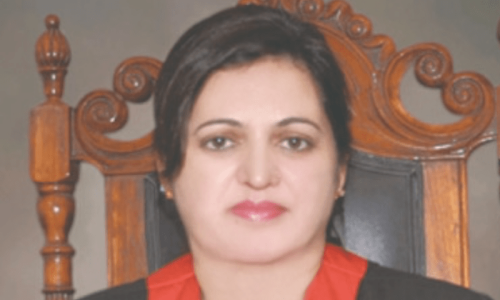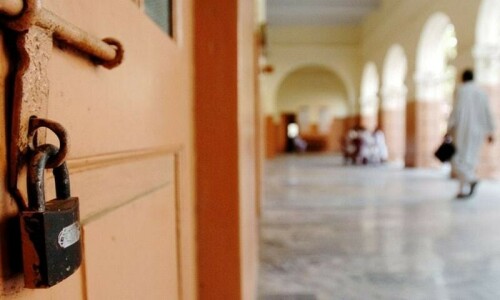ON July 2, 2024, the Judicial Commission of Pakistan (JCP) nominated Justice Shafi Siddiqui and Justice Aalia Neelum to be the next chief justices of their respective high courts.
The decision to appoint Justice Shafi Siddiqui, who is known for his vast knowledge base and swift disposals, has been widely hailed in Sindh, whereas that of Justice Aalia Neelum, who was not the senior most judge in the Lahore High Court, has also been met with relative positivity.
However, prior to July 2, the Sindh High Court Bar Association had pointed out that the JCP was seeking to consider the three senior-most judges of each high court as chief justice. As per the bar association, the senior most judge should be appointed as chief justice; the consideration of others would be “against the principles of natural justice, seniority, and the doctrine of legitimacy”.
In relying on the concept of merit trumping any form of seniority, many might disagree with the bar association’s opposition to the elevation of a junior judge as chief justice. However, although there appears to be no cavil to this principle, what qualifies as ‘merit’ is the question that has been plaguing the institution for some time now.
Without declared and established criteria for appointing a chief justice, whispers of manipulation or favouritism may follow.
In fact, upon his appointment as chief justice of Pakistan, Chief Justice Qazi Faez Isa had been seen to make efforts to finalise a formula or criteria for appointing judges. These rules, which may presumably have also included details regarding the appointment of the provinces’ chief justices, were to be placed before the JCP on May 3, 2024. However, at the meeting, this agenda item was deferred on account of the statement of the federal law minister that the government was ‘considering’ amending Article 175A of the Constitution. It was also decided that, in the meanwhile, the appointment process of judges would continue on the basis of the existing rules.
The ‘existing rules’ are the Judicial Commission of Pakistan Rules, 2010, which, ironically, do not disclose any criterion for appointment. In fact, prior to Justice Isa’s elevation to the position of chief justice of the Supreme Court, the lack of declared criteria was one of the reasons for the opposition to the elevation of junior judges to the Supreme Court, within the bench as well as in the bar.
However, not only has such criteria not evolved since then, it also appears that the practice of elevating a junior judge over a senior one has been extended to the post of ‘chief justice’ in the high courts. This is a matter of concern for several reasons.
Firstly, without declared and established criteria for appointing a chief justice, whispers of manipulation or favouritism may follow, no matter how unfair they may be. There will always remain questions as to why one judge was preferred over the other, what the superseded judge potentially lacked, and whether the superseding judge was chosen on the basis of merit or due to partiality. This hits the very credibility of the institution, and perceptions regarding its capability to do justice. In fact, many may even contend that an institution which falters in doing justice within cannot be expected to do justice without.
Secondly, appointments made in such a manner hurt the authority and standing of the appointees as much as those overlooked. Just because one judge is selected, as opposed to another, does not automatically translate into the latter lacking credibility. However, without a formalised yardstick on the basis of which people can make sense of the decisions, rumours and assumptions are bound to fill the vacuum, thereby overshadowing the merits of the appointments and of those that were overlooked. It essentially makes a good decision look bad, and a bad decision look even worse.
Also, being superseded is extremely demoralising, and can potentially lead to aspersions being cast on the conduct and credibility of the judges who were superseded. It raises several questions. For example, would a superseded judge, who is technically senior, be expected to report to his or her junior in matters of administration, or would he or she be expected to resign? Would the supersession be seen as a vote of no-confidence against his or her abilities, or just an administrative necessity? If the judge resigns, would that not be a loss to the judiciary? If the judge chooses to stay, would that not impede his or her ability to deliver justice?
On the other hand, would the junior judge be better able to command the confidence of his or her court, or less likely, if appointed by superseding others? And finally, would such a move create polarisation and division within the high courts, thereby impairing effective administration, or would it tend to resolve these?
The answers are unsettling, and that is perhaps why the Supreme Court had held in the Al Jehad case, as far back as 1996, that the most senior judge of a high court has a legitimate expectation to be considered for appointment as chief justice, and in the absence of any concrete and valid reasons to be recorded, be entitled for appointment in the court concerned.
The rationale for this observation still resonates with many today, and will continue to do so until the appointment process is made more transparent, open, and criteria-based. Doing so will not only be a service to the public, who are direct stakeholders in the dispensation of justice, but also to the judges themselves, who deserve better than the probing questions raised, the doubts created, and the misgivings left unaddressed on account of the current manner of appointments. It is often said that justice should not only be done, but also be seen to be done. In this case, perhaps, justice should not only be done, but be done with the justices themselves.
The writer is a Karachi-based lawyer
Published in Dawn, July 5th, 2024


















































